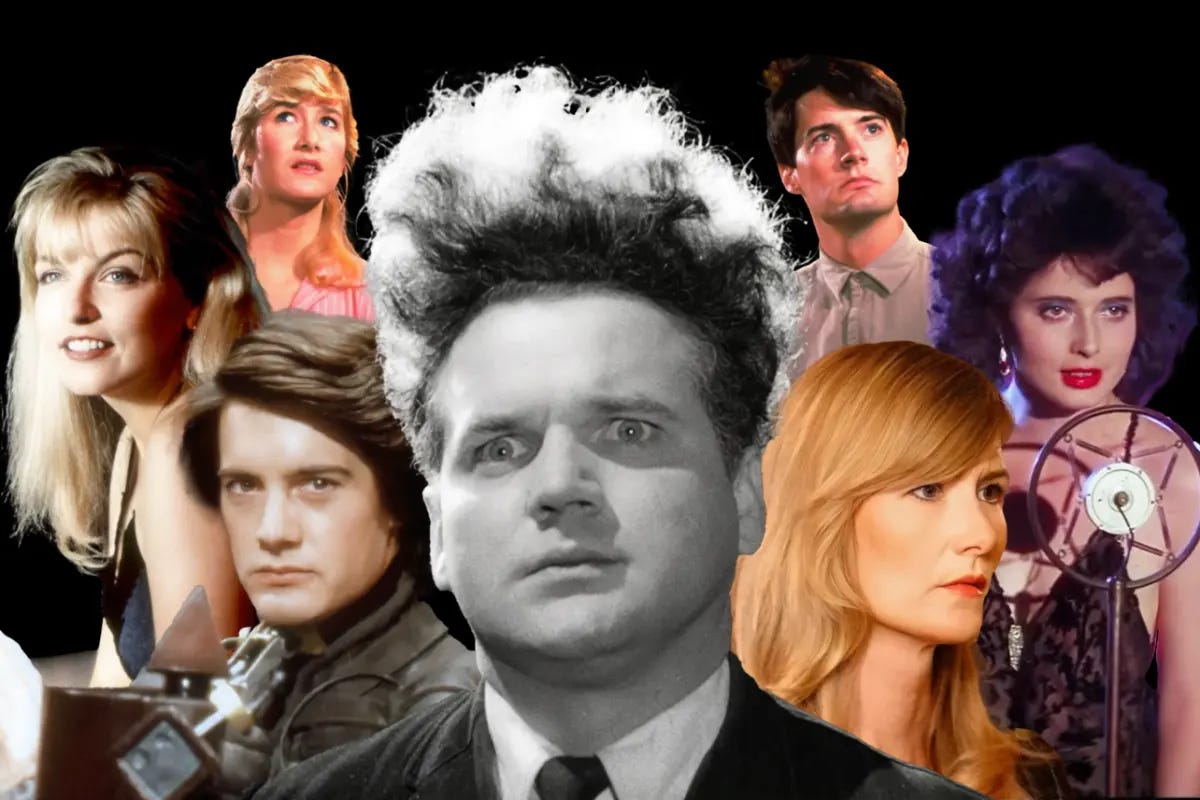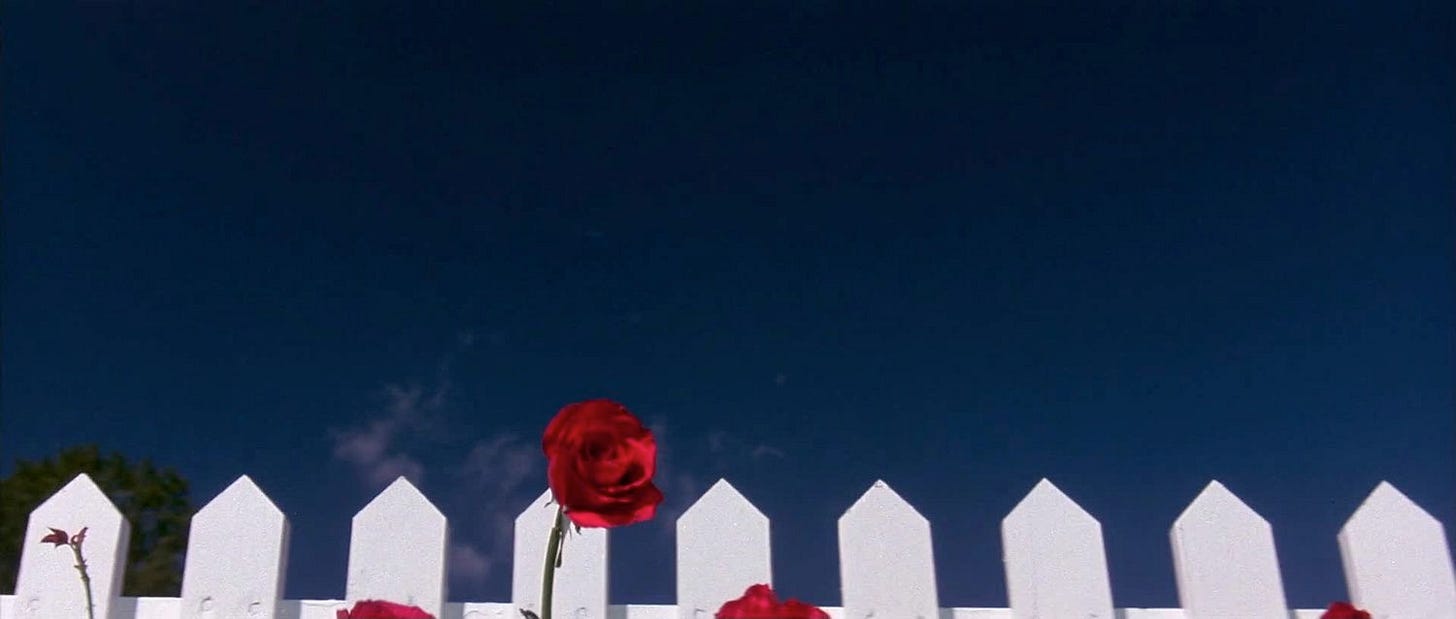I wasn’t planning to post today, I don’t want to wear people out with them, feel obliged to read, and cause substack fatigue, AND I’ve got stuff to do. But hearing about David Lynch’s passing has left me reflecting on just how much his work has been in and around me and possibly, partially, shaped my creative life.
For many of us, Eraserhead or The Elephant Man was maybe the first taste of Lynch’s unique, unsettling vision. But for me, the real gut punch was Blue Velvet. It’s one of those films that sneaks up on you, subtle yet unforgettable, one of the defining films of Reagans America in the 80s, and definitely on my desert-island list.
The big one is the obvious references to Buñuel’s, surrealist classic, ‘Un Chien Andalou’ on which I did an extended essay at college.
But then Laura Dern’s character’s, beautifully, laughably nieve earnest observations about robins and her deceptively simple questions, “Why are there people like Frank?” have always stuck with me. And then, of course, there’s Frank Booth, played by Dennis Hopper in one of the most iconically psychotically brilliant performances ever. Hopper was perfectly cast, and I could go on about him too, but let’s stick to Lynch. (Sorry, I employed 'Iconic' there. It’s so overused, I try not to, but...)
What makes Lynch’s films so captivating isn’t just their obvious weirdness, which you can enjoy for just that in itself, It’s how they manage to be unsettling and mesmerising at the same time. He’s a surrealist, yes, and who today’s Guardian obituary header states, “brought experimentalism into the mainstream” What’s less obvious to most viewers, though, is how much Lynch’s work echoes the ideas of four heavyweight philosophers: Jacques Lacan, Jacques Derrida, Gilles Deleuze, and Félix Guattari. All of whom, I discovered in my Cultural studies days (see previous post for more on that)
Now, I’m not saying Lynch was flipping through philosophy books while making Twin Peaks, but his films resonate with their ideas in ways that are hard to ignore once you have basic tools of framing, that the above offer. So I offer a half-baked, probably mis-interpreted guide to Lynch’s strange worlds through the lens of these thinkers.
Jaques Lacan, the French phenomenon, and superstar psychoanalyst, explored how our sense of self is shaped by unconscious desires, symbols, and the gaze of others. His ideas are central to film theory, especially when it comes to how we, as spectators, engage with what’s on screen. It’s why Hitchcocks Vertigo, was reappraised, and now so high in 'best of' film lists these days. Critics suddenly 'got' that it was an epic Lacanian psychodrama
In Lynch’s work, you can see this in how his characters often grapple with their fractured identities. Think of the duality in Lost Highway or Twin Peaks. Lynch blurs the line between who someone is and who they think they are, echoing Lacan’s idea of the “split subject”, the gap between our conscious selves and the unconscious forces that drive us.
Then there’s Lacan’s concept of the gaze, the idea that being observed shapes us. Lynch often makes you feel like his characters are trapped, not just in their circumstances but under the weight of being watched. The camera isn’t just recording; it’s complicit in their unravelling.
Another frere jacques – Jacques Derrida - was the philosopher of deconstruction, and argued that meaning is never fixed; it’s always unstable and open to interpretation. Lynch’s films are like a masterclass in cinematic deconstruction.
Take Mulholland Drive. It starts as one thing, a story about a hopeful actress in Hollywood, and then twists and folds in on itself, blurring the lines between dream and reality, success and failure, good and evil. Like Derrida’s concept of “différance,” where meaning is constantly deferred and reshaped, Lynch refuses to let us land on a single explanation for what’s happening.
Famed for 'A Thousand Plateaus’ and Anti-Oedipus: Capitalism and Schizophrenia, Deleuze and Guattari’s philosophy sees identity as fluid and ever-changing, and their rejection of linear structures mirrors Lynch’s approach to storytelling. They coined the term “body without organs,” which is about stripping away rigid systems to uncover raw potential. Lynch’s characters often feel like they’re being broken apart and rebuilt in strange, surreal ways.
In Eraserhead, for example, the industrial wasteland and grotesque imagery feel like a direct map of Henry’s inner anxieties. And Inland Empire shot completely on digital video, Lynch refrained from explaining the film, responding that it is "about a woman in trouble”, in which he abandons traditional storytelling entirely, creating a fragmented, kaleidoscopic journey through identity and performance.
Deleuze and Guattari’s rejection of rigid hierarchies and preference for interconnected, nonlinear systems feels like it’s baked into Lynch’s DNA as a filmmaker.
Of course, there are other lenses through which to view Lynch’s work, that’s what makes them so rich and giving. But, Lacan, Derrida, Deleuze, and Guattari have all shaped the evolution of postmodern cinema, in a kinda guerilla, submarine way, which thrives on breaking rules, rejecting tidy resolutions, and blurring boundaries. Lynch stands as a giant in this movement, weaving their ideas, knowingly or not, into films that are as confounding as they are captivating.
But what makes Lynch truly remarkable is his ability to take these complex ideas and translate them into something visceral. You don’t need a Cultural studies or philosophy degree to feel the impact of his work. His films hit you in the gut, as Blue Velvet hit for me, challenging not just how you see stories, but how you see yourself.
This is all well and good, but ultimately perhaps, watching a lynch film doesn’t have to be about figuring out any deeper meanings. It’s about letting it wash over you, surrendering to the strangeness, and allowing it to shift your perspective on the world. He invites us to embrace ambiguity. They challenge us to let go of the need for answers and sit with the uncertainty, and you just gotta luv that accent.
Rest in peace, David Lynch. Your work continues to challenge, inspire, and haunt us in the best way possible.







